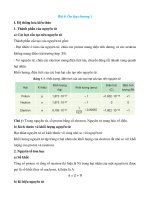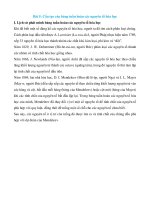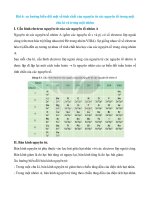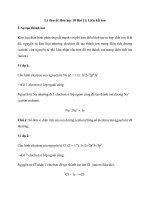Bài tập tiếng anh lớp 12 mới unit 1 life stories vndoc com
Bạn đang xem bản rút gọn của tài liệu. Xem và tải ngay bản đầy đủ của tài liệu tại đây (148.12 KB, 6 trang )
VnDoc - Tải tài liệu, văn bản pháp luật, biểu mẫu miễn phí
ƠN TẬP TIẾNG ANH LỚP 12 THEO TỪNG UNIT
UNIT 1: LIFE STORIES
I. Choose the underlined part that differs from the other three in pronunciation
in each question.
1. A. diagnose
B. achievement
C. talented
D. anonymous
2. A. prosthetic
B. reputation
C. dedication
D. respectable
3. A. distinguished B. result
C. generosity
D. respectable
4. A. perseverance B. generosity
C. talented
D. judgment
5. A. congestion
C. influential
D. reputation
B. ambition
II. Choose the word whose stress is different from the others.
6. A. celebrity
B. charitable
C. anonymous
D. respectable
7. A. overcome
B. incident
C. dedicate
D. currently
8. A. perseverance B. experience
C. dedication
D. influential
9. A. generosity
C. encyclopedia
D. creativity
B. hospitality
III. Choose the correct answer to each of the following questions
10. Her __________ to medicine was so great that she had little time for anything
else.
A. importance
B. dedication
C. emphasis
D. reputation
11. Tran Hung Dao was a great__________ to lure the enemy.
A. strategy
B. strategist
C. soldier
D. king
12. Bill Gates’ __________ in donating large sums of money towards welfare
activities is remarkable
A. generosity
B. politeness
C. wealth
D. talent
13. This school has an excellent__________ in the community.
A. image
B. reputation
C. name
D. opinion
VnDoc - Tải tài liệu, văn bản pháp luật, biểu mẫu miễn phí
14. He seems like a __________ businessman, but he caused some personal
scandals.
A. respecting B. respectful
C. respectably
D. respectable
15. As well as being a successful actor, Clint Eastwood is a __________ film
director.
A. talent
B. talented
C. distinguish
D. respectful
16. Bill Gates was__________ middle child of William H. Gates II, __________
prominent lawyer, and Mary Gates, who works as __________ teacher before she
had children.
A. The –a - a
B. a –a - a
C. the- the- a
D. the- the- the
17. She came into the room while they _______ television
A. have watched
B. watched
C. have been watching
D. were watching
18. I haven't met my grandparents for five years.
A. I often met my grandparents five years ago.
B. I last met my grandparents five years ago.
C. I have met my grandparents for five years.
D. I didn't meet my grandparents five years ago.
19. When the doctors________ at the scene of the accident, they ________ victims
still ________.
A. arrived / realized / were breathing
B. were arriving / realized / breathed
C. arrived / had realized / breathed D. were arriving/ were realizing/ were breathing
20. Who ________ when I came?
A. were you talking to
B. are you talking to
C. you are talking to
D. you were talking to
21. Tim________ his hair while I ________ up the kitchen
A. washed-was cleaned
B. was washing-was cleaning
C. was washing-cleaned
D. washed-cleaned
VnDoc - Tải tài liệu, văn bản pháp luật, biểu mẫu miễn phí
22. I am so happy to hear from Mary because I haven’t seen her ________ last year.
A. for B. on C. since
D. later
23. As she ________ a letter last night, the lights suddenly ________ out.
A. was writing/ went
B. wrote/ went
C. was writing/ was going D. writes/ went
24. How ________ since we ________ school?
A. are you/ left
B. will you be/ had left
C. have you been/ had left D. have you been / left
25. ________ youngest boy has just started going ________ school.
A. the/ x
B. a/ x
C. x/ the
D . an/ x
C. an
D. the
26. Hanoi is ________ capital of Viet Nam.
A. a
B. x
27. She visited ________ France and ________ United States last month.
A. x/ the
B. the/ the
C. the/ x
D. x/ x
IV. Read the passage and choose the best answer:
Different cultures follow their own special customs when a child's baby teeth fall out.
In Korea, for example, they have the custom of throwing lost teeth up on the roof of
a house. According to tradition, a magpie will come and take the tooth. Later, the
magpie will return with a new tooth for the child. In other Asian countries, such as
Japan and Vietnam, children follow a similar tradition of throwing their lost teeth
onto the roofs of houses.
Birds aren't the only animals thought to take lost teeth. In Mexico and Spain,
tradition says a mouse takes a lost tooth and leaves some money. However, in
Mongolia, dogs are responsible for taking teeth away. Dogs are highly respected in
Mongolian culture and are considered guardian angels of the people. Tradition says
that the new tooth will grow good and strong if the baby tooth is fed to a guardian
angel. Accordingly, parents in Mongolia will put their child's lost tooth in a piece of
meat and feed it to a dog.
VnDoc - Tải tài liệu, văn bản pháp luật, biểu mẫu miễn phí
The idea of giving lost teeth to an angel or fairy is also a tradition in the West. Many
children in Western countries count on the Tooth Fairy to leave money or presents
in exchange for a tooth. The exact origins of the Tooth Fairy are a mystery, although
the story probably began in England or Ireland centuries ago. According to tradition,
a child puts a lost tooth under his or her pillow before going to bed. In the wee hours,
while the child is sleeping, the Tooth Fairy takes the tooth and leaves something else
under the pillow. In France, the Tooth Fairy leaves a small gift. In the United States,
however, the Tooth Fairy usually leaves money. These days, the rate is $1 to $5 per
tooth, adding up to a lot of money from the Tooth Fairy!
(Source: Reading Challenge 2 by Casey Malarcher & Andrea Janzen)
28. What is the passage mainly about?
A. Traditions concerning children's lost teeth
B. Presents for young children's lost
teeth
C. Animals eating children's lost teeth
D. Customs concerning children's new
teeth
29. The word "their" in paragraph 1 refers to ___________.
A. houses'
B. roofs'
C. children's D. countries'
30. According to the passage, where is a child's lost tooth thought to be taken away
by a mouse?
A. In Mexico and Spain
B. In Mongolia
C. In Japan and Vietnam
D. In Korea
31. According to paragraph 2, parents in Mongolia feed their child's lost tooth to a
dog because .
A. they know that dogs are very responsible animals
B. they believe that this will make their child's new tooth good and strong
C. they think dogs like eating children's teeth
D. they hope that their child will get some gifts for his or her tooth
32. The word "origins" in paragraph 3 is closest in meaning to _______.
VnDoc - Tải tài liệu, văn bản pháp luật, biểu mẫu miễn phí
A. countries B. families
C. beginnings
D. stories
33. According to the passage, which of the following is NOT true about the tradition
of tooth giving in the West?
A. Children give money to the Tooth Fairy.
B. Children put their lost teeth under their pillows.
C. Children hope to get money or gifts from the Tooth Fairy.
D. Lost teeth are traditionally given to an angel or fairy.
34. The phrase "the wee hours" in paragraph 3 probably refers to the period of time.
A. early in the evening
B. soon after midnight
C. late in the morning
D. long before bedtime
V. Read the test and choose the word or phrase ( A, B, C, D) that best fits each
space
Henry Ford was born (35) _______ a farm in Michigan in 1863 but he did not like
farming. When he was fifteen he began work as a mechanic and in 1893 he built his
first car. After he (36)________ driven it 1,500 kilometres, he sold it and built two
bigger cars. Then, in 1903, he started the Ford Motor Company. By (37) ______
strong but light steel, he built cheap cars for (38) ________ people to buy. In 1908,
he built the first Ford Model “T”, (39) ________ sold for $825. He was soon selling
100 cars a day. By 1927, the Ford Motor Company was (40) _________
$ 700 million. Early Ford cars were simple and cheap, but (41) ________ things
simple sometimes meant less choice. “You (42) _________to have any colour you
like,” said Henry Ford of the Model T, “as long as it’s black.”
35:
A. to
B. on
C. of
D. out
36:
A. had
B. was
C. is
D. has
37:
A. putting
B. using
C. managing
D. operating
38:
A. ordinary
B. typical
C. usual
D. general
39:
A. where
B. what
C. who
D. which
40:
A. rich
B. dear
C. worth
D. expensive
VnDoc - Tải tài liệu, văn bản pháp luật, biểu mẫu miễn phí
41:
A. staying
B. keeping
C. holding
D. remaining
42:
A. ought
B. need
C. will
D. can
VI. These sentences are incorrect. Correct them, adding articles where
necessary.
43. Do English drink tea or coffee at breakfast?
44. We returned from two-week holiday in Philippines and Indonesia.
45. When you go to Paris, don't forget to visit Louvre and take boat trip along Seine.
46. You'll need warm hat, new coat and pair of woolen gloves for your trip to
Europe this season.
47. My mother said she would go to bank on Fir Street to withdraw some money,
and then she would drop by supermarket near theatre on way home.
48. In rush hour in Ha Noi, it's more convenient to travel by motorbike than to take
taxi.
49. We had great time in USA last summer.
50. John decided to join army and become soldier so that he could fight for country.
Mời bạn đọc tham khảo thêm tài liệu Tiếng Anh lớp 12 tại đây:
Bài tập Tiếng Anh lớp 12 theo từng Unit: />Bài tập Tiếng Anh lớp 12 nâng cao: />Bài tập trắc nghiệm trực tuyến Tiếng Anh lớp 12: />








